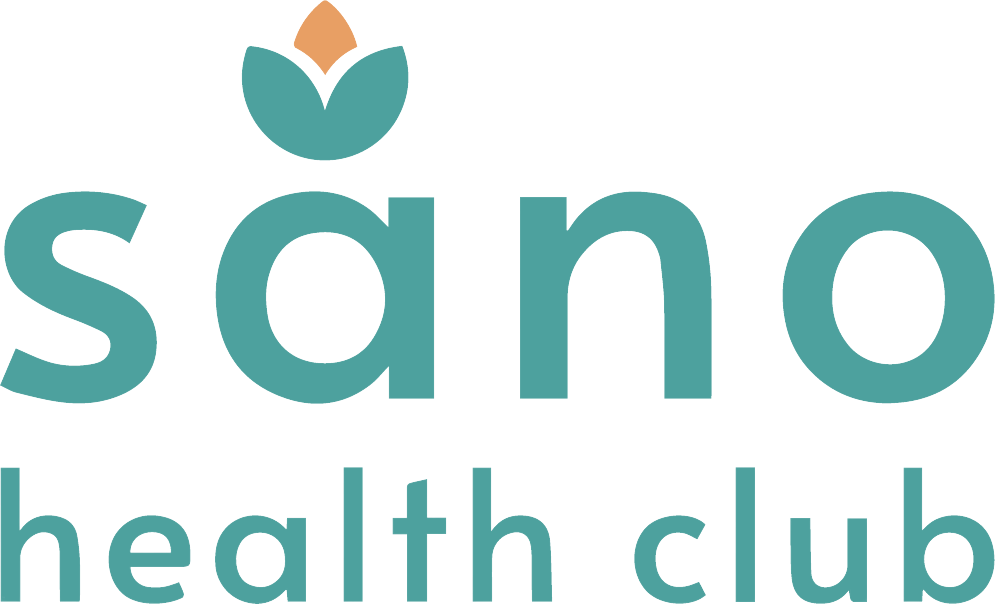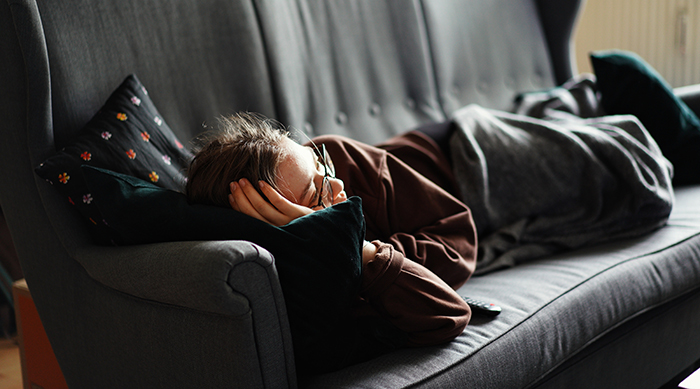Is itchiness a symptom of menopause? Though it’s not as well-known as hot flashes and mood swings, itchiness on the face, body, and/or genitals can be a symptom of menopause.
Itchy skin, known as pruritus, can be caused by many factors. Skin conditions such as eczema and psoriasis can cause itchy skin. An allergic reaction, a bug bite, or persistently dry skin can cause skin irritation. Itchy skin that often happens at night is called nocturnal pruritus (NP).
If you experience menopause itching, it may appear with other symptoms like fatigue, mood changes, or unexpected weight gain.
Let’s examine why this happens and what you can do.
Hormonal Causes of Itchy Skin
During menopause, the body’s estrogen production slows down. Declining estrogen levels may cause a cascade of skin changes, including dryness, fine wrinkles, slower wound healing, and thinning of the skin.
Does low estrogen cause itchy skin? As levels of estrogen drop, the production of collagen slows. As a result, skin may thin (weaken), lose elasticity, and become drier.
Menopause symptoms often appear together, such as:
- Itchy skin (including vaginal itching)
- Hot flashes
- Mood swings
- Night sweats
- Vaginal dryness
- Weight gain
Though itchy skin is the primary skin change most women notice, others may experience additional irritations.
Some women report feeling pins/needles pricking sensation on their skin, a condition known as paresthesia. Others report formication, or the sensation of bugs crawling on or under their skin.
Phases of Female Hormone Changes That Impact Skin
Menopause isn’t the only period in women’s health where skin changes are a common symptom of hormonal changes.
Puberty is the first transitional phase in a girl’s life when hormones, especially androgens, fluctuate. Puberty can cause acne, excessive sweating, and scalp dermatitis.
Hormonal changes during pregnancy can affect the skin. Pruritic urticarial papules and plaques of pregnancy (PUPPP) is a rash that can form in stretch marks in the third trimester of pregnancy. Melasma is another hormone-related skin condition triggered by pregnancy, when brown or blue-gray splotches appear on the face or forearms.
Perimenopause is the stage just before menopause. Skin issues can include acne or rosacea (a skin condition in which the face, neck, and chest become red). Also during perimenopause, skin may lose its tightness and smoothness as collagen production begins to slow.
Finally, menopause and post-menopause are often marked by skin changes like dryness, paresthesia, formication, slow wound healing, and thinning of the skin.
What can trigger menopause itching at night?
Increased menopausal itchiness at night (NP) is likely caused by a combination of your circadian rhythm (your body’s internal clock), diet/lifestyle, and hormone imbalances. However, if you have a diagnosed skin condition, you may need to talk to your dermatologist before assuming your issues are hormone-related.
You may notice your itchiness more at night simply because your body’s clock tells you it’s time to slow down. Reducing stimulation in the evening might make skin concerns more obvious.
Your diet and lifestyle also play a large part in menopause itching. Pay attention to foods or drinks you consume that seem to coincide with itchy skin. Poor water intake will contribute to dryness. Factors from your laundry detergent to your stress level can make your skin dry out and feel more itchy.
How to Treat Itchy Skin Caused by Hormones
Home Remedies
- Eat a healthy diet: Processed food and sugar can cause or worsen skin dryness and itchiness. Improve your diet by eating a balance of high-fiber plant foods, whole grains, lean meats, and healthy fats. Incorporate foods known to be good for the skin, such as fish rich in omega-3 fatty acids, fruits with vitamin C, and high-antioxidant dark chocolate.
- Try herbal supplements: Supplements containing phytoestrogens (plant compounds that act similarly to estrogen) may reduce menopause symptoms including itchy skin. Black cohosh, red clover, and dong quai are some of the most widely studied phytoestrogens.
- Use probiotics: Incorporate a probiotic to improve your gut health. Itchy skin can result from an unhealthy gut microbiome or from food allergies/intolerances.
- Moisturize: Regularly hydrating your skin with a fragrance-free moisturizer can reduce dryness that leads to scratchy skin.
- Use a cold compress: Covering your itchy skin with a cool compress may help reduce your skin issues, particularly if they’re keeping you up at night.
- Take an oatmeal bath: Oatmeal baths may help to reduce skin inflammation and irritation.
Related: The Best Diet for Menopause
Medical Treatments
- Hormone replacement therapy (HRT): This treatment will likely be the most effective in decreasing your menopausal symptoms, such as itchy skin. There can be side effects, such as weight gain and breast tenderness. We talk to many patients about bioidentical HRT (bHRT) or HRT alternatives.
- Anti-itch creams: Over-the-counter creams can contain a variety of ingredients from diphenhydramine, hydrocortisone, numbing agents, and natural soothing ingredients like aloe. Even if they don’t provide lasting relief, they may provide a quick-fix in a pinch.
- Antihistamines: These can be purchased at a drugstore or prescribed by a doctor. Antihistamines come in the form of pills, creams, and nasal sprays. They can cause drowsiness and aren’t appropriate for everyone, so discuss these with your healthcare provider.
- Corticosteroids: Over-the-counter brands tend to contain about 1% hydrocortisone. Your doctor may also prescribe creams with larger concentrations of steroids in the form of foams, gels, ointments, or creams to address redness, swelling and itching.
Lifestyle Changes to Prevent Menopause Itching
- Take cool showers: Hot water can more easily strip the skin of natural oils that help prevent skin irritation. Try taking slighter cooler showers or even cool oatmeal baths. Pat yourself dry (rather than rubbing).
- Hydrate: Drink about 8 glasses of water a day to help keep your skin from drying and becoming itchy.
- Use healthy skincare: When purchasing cleansers, soaps, and lotions, be sure to look for brands that have neutral fragrance options. Opt for fewer ingredients, particularly detergents that may contribute to skin drying. EWG has a great database of beauty and skincare products, rated by ingredient safety.
- Reduce stress: Long periods of stress can increase skin problems, including dryness, itchiness, swelling, sensitivity, oiliness, and more. Prioritize your stress levels and reduce stress by maintaining healthy relationships, spending time in nature, and creating space in your life to rest.
- Ditch alcohol and tobacco: Both alcohol and tobacco can have negative impacts on skin hydration and sleep quality.
- Update your bedtime routine: For the most restful sleep, try to go to bed and wake up at around the same time every night. Consider sleeping in breathable cotton clothing. Keep your thermostat on the low side (around 68 degrees F is generally good for sleeping).
- Be cautious with sun exposure: Harmful UV rays may cause skin damage that leads to itching. Limit your sunscreen-free time outside.
When to See a Doctor
In some rare cases, itchy skin can be a sign of a more serious illness. Symptoms to look for include:
- Bruises that manifest easily
- Itches that involves your entire body
- Rashes that don’t go away or any concerning skin lesions
- Persistent itchiness that lasts for more than 10 consecutive days
If you’re experiencing the above symptoms, contact your healthcare provider as soon as possible.
Whole-Body Support for Your Hormones
We love questions! If you’re still curious about your skin symptoms and want further insight into treatment options, schedule an intro call with a care team member.
Sources
- Hall, G., & Phillips, T. J. (2005). Estrogen and skin: the effects of estrogen, menopause, and hormone replacement therapy on the skin. Journal of the American Academy of Dermatology, 53(4), 555-568.
- Bergler-Czop, B., & Brzezińska-Wcisło, L. (2013). Dermatological problems of the puberty. Advances in Dermatology and Allergology/Postępy Dermatologii i Alergologii, 30(3), 178-187.
- Matsui, M. S., Pelle, E., Dong, K., & Pernodet, N. (2016). Biological rhythms in the skin. International journal of molecular sciences, 17(6), 801.
- Akdeniz, M., Tomova‐Simitchieva, T., Dobos, G., Blume Peytavi, U., & Kottner, J. (2018). Does dietary fluid intake affect skin hydration in healthy humans? A systematic literature review. Skin Research and Technology, 24(3), 459-465.
- Silva, T. R., Oppermann, K., Reis, F. M., & Spritzer, P. M. (2021). Nutrition in Menopausal Women: A Narrative Review. Nutrients, 13(7), 2149.
- Passeron, T., Zouboulis, C. C., Tan, J., Andersen, M. L., Katta, R., Lyu, X., … & Peters, E. M. J. (2021). Adult skin acute stress responses to short‐term environmental and internal aggression from exposome factors. Journal of the European Academy of Dermatology and Venereology, 35(10), 1963-1975.
- Chen, M. N., Lin, C. C., & Liu, C. F. (2015). Efficacy of phytoestrogens for menopausal symptoms: a meta-analysis and systematic review. Climacteric, 18(2), 260-269.
- Ghazanfarpour, M., Sadeghi, R., Roudsari, R. L., Najmabadi, K. M., & Khadivzadeh, T. (2015). Effects of red clover on hot flash and circulating hormone concentrations in menopausal women: a systematic review and meta-analysis. Avicenna journal of phytomedicine, 5(6), 498.
- Pazyar, N., Yaghoobi, R., Kazerouni, A., & Feily, A. (2012). Oatmeal in dermatology: a brief review. Indian Journal of Dermatology Venereology and Leprology, 78(2), 142.
- Wang, S., Wang, Y., Xu, J., & Chen, Y. (2017). Is the oral contraceptive or hormone replacement therapy a risk factor for cholelithiasis: A systematic review and meta-analysis. Medicine, 96(14).
- Wu O. (2005). Postmenopausal hormone replacement therapy and venous thromboembolism. Gender medicine, 2 Suppl A, S18–S27.


